Is Bariatric Surgery a Short Term Fix for a Long-term health problem? Here we delve into the world of Bariatric Surgery.
Contents:
- What is Bariatric Surgery
- Bariatric Surgery Types
- Bariatric Surgery Side Effects
- Cost of Bariatric Surgery without Insurance
Life brings with it many problems – socio-economic, relationship, self confidence (or lack of), employment stability and abuse by a 3rd party, to name but a few. All of these experiences can have a dramatic influence on our mental and physical well-being. Many of us turn to food for comfort and become overweight and/or obese. Many turn to surgical intervention for weight loss – Bariatric Surgery.
Personally, I know many people who struggle with obesity for a variety of reasons. At least 1 has tried bariatric surgery for weight loss, only to put all the weight back on. So, if you’ve come to the decision to lose weight and are contemplating bariatric surgery for weight loss, you need to read this research driven article in its entirety to understand the implications and problems incurred with bariatric surgery. Whatever the reason to lose weight you have, consider the facts carefully as there are better ways to lose weight than bariatric surgery. There are pros and cons of all weight loss methods!
What’s Bariatric Surgery?
Bariatric surgery, also known as weight loss surgery, is a procedure performed on severely obese people to help them lose weight.
This type of surgery is usually recommended for people with a Body Mass Index of 40 or higher. However, where there are additional obesity related health issues such as diabetes or sleep apnea, the acceptable BMI considered for surgery is dropped to 35.
4 Main Types of Bariatric Surgery
Over the years bariatric surgery has evolved to accommodate the varying nature of individuals requesting bariatric surgery and their individual needs. Currently, there are 4 main types of bariatric surgery :
- Laparoscopic Adjustable Gastric Band (LAGB)
- Laparoscopic Vertical Sleeve Gastrectomy (LVSG)
- Laparoscopic Biliopancreatic Diversion (BPD)
- and Laparoscopic Roux-en-Y Gastric Bypass (LRYGB)
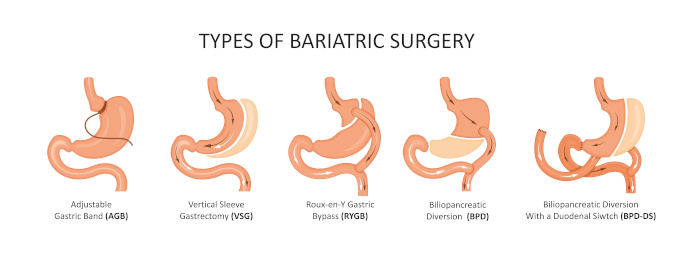
Laparoscopic Adjustable Gastric Band
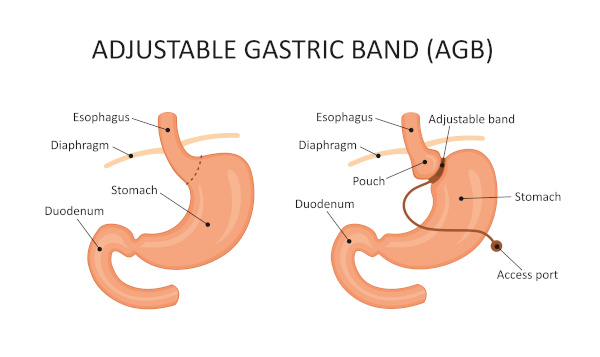
Laparoscopic adjustable gastric banding (LAGB) is a surgical weight loss procedure that involves placing a band around the upper part of the stomach. This band creates a small pouch to limit the amount of food that can be consumed. The band is adjustable and can be tightened or loosened as needed to control the rate of weight loss.
LAGB is a minimally invasive procedure that requires only small incisions, resulting in less pain and a faster recovery time than traditional open surgery.
However, LAGB has been associated with a high rate of complications, including band slippage, erosion, and infection, and is less effective than other weight loss surgeries in achieving long-term weight loss.
Image : Adobe / nmfotograf
Laparoscopic Vertical Sleeve Gastrectomy
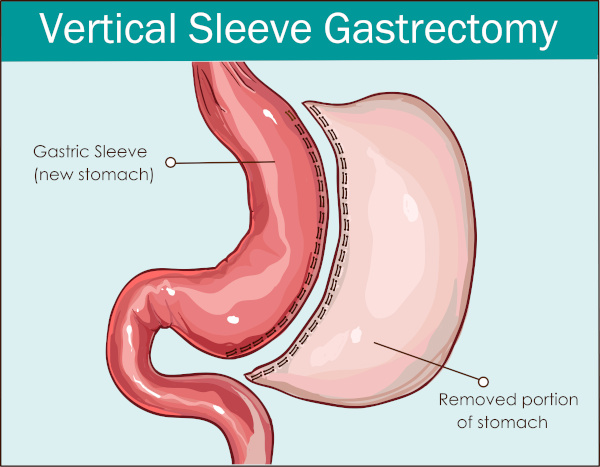
Laparoscopic vertical sleeve gastrectomy (VSG) is a surgical weight loss procedure that involves removing a large portion of the stomach. This procedure creates a smaller, banana-shaped stomach that limits the amount of food that can be consumed.
VSG is a minimally invasive procedure that can result in significant weight loss and improvement in obesity-related health conditions. However, Vertical Sleeve Gastrectomy is a major surgery that carries risks of complications such as bleeding, infection, and leakage, and may require lifelong dietary and lifestyle changes.
Unlike gastric banding, VSG is irreversible and does not require the placement of a foreign object in the body.
Image : Adobe / corbacserdar
Laparoscopic Roux-en-Y Gastric Bypass
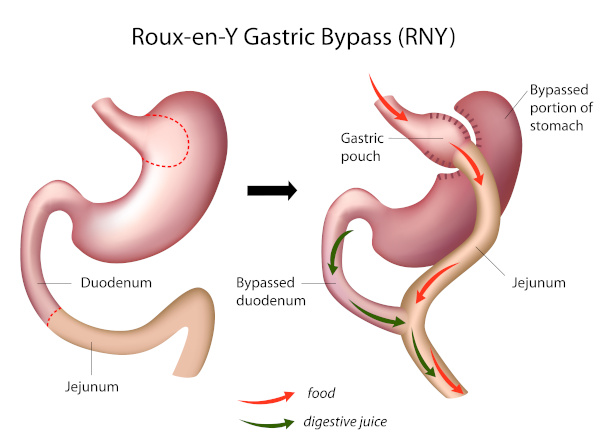
Laparoscopic Roux-en-Y gastric bypass (RYGB) is a weight loss surgery that involves creating a small pouch in the upper stomach. A portion of the small intestine is used to bypass the larger portion of the stomach and a section of the small intestine.
This procedure restricts the amount of food that can be consumed and decreases the amount of nutrients and calories absorbed by the body. RYGB is an effective procedure that can result in significant weight loss and improvement in obesity-related health conditions.
However, RYGB is a major surgery that carries risks of complications such as bleeding, infection, and bowel obstruction.
Image : Adobe / Alila Medical Media
Laparoscopic Biliopancreatic Diversion
Laparoscopic biliopancreatic diversion (BPD) is a weight loss surgery that involves removing a large portion of the stomach and re-routing the small intestine to reduce the amount of calories and nutrients that are absorbed by the body. Biliopancreatic Diversion is a complex and highly effective procedure that can result in significant weight loss and improvement in obesity-related health conditions. BPD is typically reserved for patients with a body mass index (BMI) greater than 50 or for those with severe obesity-related health conditions. However, BPD is a major surgery that carries risks of complications such as malnutrition, vitamin deficiencies, and bowel obstruction.
While Bariatric surgery can be effective for weight loss (many patients lose a significant amount of excess weight in their first year after the procedure), Bariatric surgery is NOT a Quick Fix.[1] Bariatric surgeons will assess you for eligibility for surgery and, if agreed, will recommend a change of diet in preparation for surgery and post-operatively. All reputable Bariatric surgeons / clinics will expect you to commit to long-term lifestyle improvements including adopting a healthy diet and exercise.
Bariatric Surgery Side Effects and Risks
As with any surgical procedure, Bariatric Surgery comes with a list of risks and side effects [2,3&4]. Here are……
12 Common Side Effects and Risks of Bariatric Surgery…
- Anesthesia related risks. Obese people are at greater risk of anesthesia related problems.
- Infection
- Weight Gain or Failure to Lose Weight
- Perforation of Stomach or Intestines. Infection from a leaking intestine can cause peritonitis. Peritonitis can lead to abdominal sepsis => septic shock and Death. “abdominal sepsis exhibits the highest mortality rate with 72%. The long-term prognosis is equally poor; only approximately 30% survived the first year after hospital admission.” [4]
- Protein or Calorie Malnutrition
- Pulmonary or Cardio Problems
- Vitamin or Iron Deficiency
- Dumping Syndrome
- Malnutrition
- Osteoporosis
- Alcohol Abuse which can lead to psychiatric issues and suicide.
- Colorectal Cancer Risks
Nutritional Disorders
Malabsorption of nutrients caused through disconnection of the first portion of the small bowel from the stomach. This section of the small bowel is responsible for the absorption of :
- Iron
- Calcium
- Folate
- Vitamin A
- Vitamin B1
- Vitamin B12
- and Vitamin D
Extensive follow up of post bariatric patients reveal they are 5x more likely to suffer from nutritional disorders. [3]
Additionally, long term observations indicate a 3x increased risk of anemia caused through the Iron or Vit B12 deficiency. [3]
Reduced Bone Mineral Density
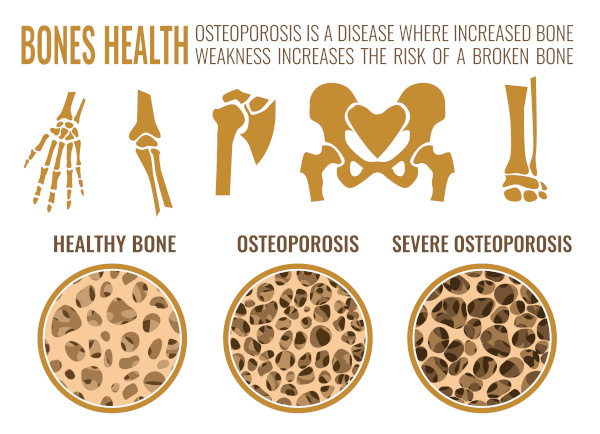
Osteoporosis.
Poor absorption of Calcium and Vitamin D can result in a reduced bone mineral density. Low bone mineral density can result in osteoporosis and increased risk of bone fractures.
Healthy, balanced diets rich in micronutrients support bone health and weight loss.
Image : Adobe/Double Brain
Dumping Syndrome
The rapid transfer of recently ingested foods can cause ‘late dumping’ from undigested carbohydrates. This can then cause hypoglycaemia 1-3 hrs after the meal. Late Dumping can be managed with a low carbohydrate diet.
Alcohol Abuse

Bariatric Surgery: Post Surgery Alcohol Abuse
Post bypass patients are also at risk of alcohol abuse. This may be due to increased speed of transit and absorption of alcohol to the bloodstream. Alcohol abuse can also lead to psychiatric health issues including depression and anxiety.While the death rate from obesity is reduced from Bariatric Surgery, suicide rates of patients increase 7x due to the various psychiatric problems.
Image : Adobe Stock / AntonioDiaz
Cancer Risks
Obesity itself carries numerous risks of cancer – many health institutions and clinics corroborate this. Bariatric surgery inherently reduces many of the current risks of cancer. However, while the “reduced obesity” reduces the variety of cancers obese people can suffer, long term studies reveal Bariatric Surgery may increase the risk of Colorectal Cancer.
Cost of Bariatric Surgery without Insurance
Healthcare companies, institutions and clinics vary and quote a variable price depending on geographic location, currency, institutional reputation and individual surgeons fees.
Bariatric surgery clinics (depending on reputation) may also prey on the needy for the valuable income they may receive from the surgical procedure – not all clinics work to the same high ethics standards we might expect. With the high health risks involved, you would be well advised to seek out a reputable clinic with a high skill and ethics level.
Here in the UK, there are numerous private health institutions that provide a variety of essential (and non essential) surgical procedures. BUPA (one of the more established and reputable private healthcare companies perform Bariatric Surgery.
Bupa quote £8,000:00 – £15,000:00 for a Gastric Sleeve. Here are some representative figures for the Cost of Bariatric Surgery in the UK
“Gastric Sleeve prices typically cost between £7,000 and £11,000 throughout the UK. Ramsay Health Care Weight Loss Surgery charges from £8,555.”
RamsayHealth / Bariatric Surgery Cost
Private Bariatric Surgery available via the NHS…
The cost of private weight loss surgery can vary. Typical prices are:
NHS Private Bariatric Surgery Cost
- gastric band surgery – £4,000 to £8,000
- gastric bypass – £8,000 to £15,000
- sleeve gastrectomy – £8,000 to £10,000
“How Much Does It Cost to Have Weight Loss Surgery?”
Packages from the London Obesity Group start at:
London Obesity Group
- £8995 for a gastric bypass
- £7399 for a gastric sleeve
- £5950 for a gastric band
The Best of Health.co.uk : How Much Does Weight Loss Surgery Cost?
Weight Loss Surgery Type:
Average Price Range
Gastric Balloon Surgery: £3,450 – £7,500
Gastric Band Surgery :£4,995 – £9,600
Gastric Bypass Surgery :£7,995 – £15,000
Gastric Sleeve Surgery :£7,995 – £15,000
The above prices are for Bariatric Surgery UK. Here are a few examples on the…
Cost of Bariatric Surgery US…
Bariatric surgery costs can vary widely depending on your location, medical needs and insurance, but generally range from around $7,500 to more than $30,000 before insurance.
Money.com / Liz Seegert
“THE COST OF POPULAR BARIATRIC SURGERIES“
IBI Healthcare.com
Bariatric Surgery Average National Cost Lap band $8,900 Gastric sleeve $9,000 Gastric bypass $15,000 Duodenal switch $22,000 “HOW MUCH DOES BARIATRIC SURGERY COST?” by A. Christopher Ibikunle MD FACS / February 18, 2022
“Bariatric Surgery Cost in the US“
Extract from Miami Lakes Cosmetics List of Bariatric Surgery Prices in US…
Bariatric Surgery Cost in the US
New York $23,700 – $65,100
The above figures are publicly listed by the respective institutes / clinics. Prices are Correct at Time of Publishing : 13th May 2023. With the wide variation of costs and side effects, only you can decide If and How to proceed.
Is Bariatric Surgery Right for You?
Many people who consider bariatric surgery turn to bariatric surgery for a quick fix to their weight problem. However, there are many side effects and associated health risks with bariatric surgery on obese people. Consider these problematic facts:
- Obese people are more likely to suffer complications under anesthesia than none obese.[6] [7]
- 5% of Bariatric Surgery patients Died within the first week after surgery [6]
- Reputable Clinics will expect you to undertake a weight loss diet prior to and post surgery and Lose 5-10% body-mass before surgery.[7]
- Obese Patients Suffer 5x More Heart Attacks under Anesthesia than non obese Patients [5]
- Death Rates for Morbidly Obese Patients (BMI>40) are 2x Higher than Obese patients [5]
- Weight Loss of 7.4kg has been shown to reduce hypertension and insulin resistance. [7]
- Low Calorie Diets have been shown to Reduce Liver size by 14% – Recommended before Surgery [7]
With all these side effects and health risks, the question has to asked, is Bariatric Surgery worth the risks and is it right for you?
Also consider, reputable clinics will expect you to commit to a weight loss plan before and after surgery [2],[7],. The Mayo Clinic clearly state that bariatric surgery is not for everyone who is severely overweight [8] and that “you will be willing to make permanent changes to lead a healthier lifestyle“. The fact that even bariatric surgeons will expect you to lose weight before surgery by adopting a healthy eating lifestyle AND agree to continue the healthy eating lifestyle post-surgery should become your weight loss motivation amid the myriad of reasons to lose weight.
For more information on Bariatric Surgery and its Pros and Cons read: “Bariatric Surgery Pros and Cons”.
Further Reading on Healthy Eating and Weight Loss
Selenium Benefits for the Thyroid
Dietary Fats and Saturated Fats for Health and Weight Loss : The Shocking Truth
Special Report : “How a Simple Personalised Diet Plan Gave Me My Life Back“
Recommended Weight Loss Programs

Lose Weight with the Fat Burning Kitchen.
Discover the simple truth about weight loss and how you can turn your body into a 24/7 Fat Burning Machine with a simple change of diet without starving.
Discover the truth (and the lies) behind saturated fats and why they are actually great for weight loss. (Hint, it’s not fats that cause weight gain).
Try this simple weight loss quiz about a personalised diet and nutrition plan that will help you lose weight without starving……
References and Citations
[1] “Quick Fix or Long Term Cure? Pros and Cons of Bariatric Surgery” James A.Madura + John K DiBaise
[2] “Bariatric Surgery Risks, Complications and Side Effects” www.upmc.com/
[3] “What Do We Know About Long-Term Effects of Bariatric Surgery?” British Journal of Surgery. 27th Sept 2022
[4] “Abdominal sepsis from Perforated Intestines” PubMed. Nat Lib of Medicine M H Schoenberg 1, M Weiss, P Radermacher
[5] “The Obese Patient and Anesthesia” Richard Novak, MD, The Anesthesia Consultant
[6] “Morbidity and mortality related to anesthesia and surgery in 60 patients treated with bariatric surgery“. Vieito Amor M, Hernández Iniesta J, Santiveri X, García Ch, Maestre P, Villalonga A, Ruiz B. Morbimortalidad anestésica-quirúrgica en 60 pacientes intervenidos de cirugía bariátrica [Morbidity and mortality related to anesthesia and surgery in 60 patients treated with bariatric surgery]. Rev Esp Anestesiol Reanim. 2002 Aug-Sep;49(7):365-72. Spanish. PMID: 12455117.
[7] “Perioperative care of the obese patient” M.Carron et al, British Journal of Surgery,
[8] Bariatric surgery The Mayo Clinic

